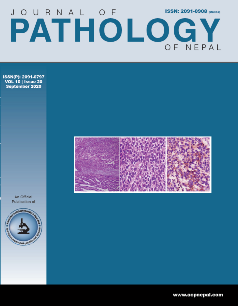A brief overview of homologous recombination deficiency testing in cancers for the ‘Next-Generation’ Pathologist
DOI:
https://doi.org/10.3126/jpn.v10i2.29862Keywords:
Cancer genomics; Genomic scar assay; Homologous recombination deficiency; Homologous recombination repair genes; HRD status of tumors; Mutational signatures; PARPi responsiveAbstract
Genomic instability is one of the hallmarks of cancer, having a crucial role in cancer pathogenesis as well as tumor proliferation. This essential feature is secondary to dysregulation of DNA damage repair pathways. Homologous repair represents the most reliable double-strand break repair mechanism. Homologous recombination deficiency is responsible for generating and perpetuating DNA damage in cancer, posing an opportunity for targeting treatment with poly(ADP-ribose) polymerase inhibitors through ‘synthetic lethality’, as well as platinum-based agents. Comprehensive genomic analysis has made it possible to discover molecular biomarkers that assist in the identification of Homologous recombination deficient tumors, allowing for the expansion of such treatment strategies to various other malignancies. Leveraging the improvement of genomic analysis methods to be more efficient in identifying Homologous recombination deficiency is crucial in the advancement of cancer care. The current review highlights the current strategies for Homologous recombination deficiency detection, clinical implications, limitations, and applicability.
Downloads
Downloads
Published
How to Cite
Issue
Section
License
This license enables reusers to distribute, remix, adapt, and build upon the material in any medium or format, so long as attribution is given to the creator. The license allows for commercial use.




